|
|
|
Sort Order |
|
|
|
Items / Page
|
|
|
|
|
|
|
| Srl | Item |
| 1 |
ID:
131354
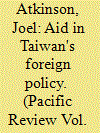

|
|
|
|
|
| Publication |
2014.
|
| Summary/Abstract |
Taiwan's foreign aid policy is largely a response to its China-imposed international isolation. Taiwan provides aid without stringent accountability conditions to countries in Africa, the Americas, and the South Pacific in order to maintain official diplomatic relations in the face of Chinese opposition. Often at odds with this is Taiwan's interest in seeking western support through being seen as a responsible aid donor. Domestic political constraints on Taiwan's aid budget accentuate the tension between these two interests. Taiwan's aid program can be seen as the product of these three competing and enduring pressures - maintaining the count of official diplomatic relationships, improving its international reputation, and containing aid spending.
Taiwan President Ma Ying-jeou's tacit 'diplomatic truce' with China - part of a wider warming of intergovernmental relations across the Taiwan Strait - has reduced significantly the squeeze between these three pressures on Taiwan's foreign aid policy. It has allowed the Ma administration to improve Taiwan's reputation, while maintaining or even reducing its aid expenditure, and still retain the same number of official diplomatic relationships. Nevertheless, the Ma administration has not wanted to alienate recipient governments while the prospects for the diplomatic truce with China remain uncertain. There remains considerable continuity with past practices, and the government's handling of aid as a foreign policy tool is still largely opaque and unaccountable.
|
|
|
|
|
|
|
|
|
|
|
|
|
|
|
|
| 2 |
ID:
000684
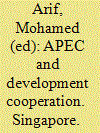

|
|
|
|
|
| Publication |
Singapore, Institute of Southeast Asian Studies, 1998.
|
| Description |
x, 185p.
|
| Standard Number |
9812300201
|
|
|
|
|
|
|
|
|
|
|
|
Copies: C:1/I:0,R:0,Q:0
Circulation
| Accession# | Call# | Current Location | Status | Policy | Location |
| 042024 | 382.9159/ARI 042024 | Main | On Shelf | General | |
|
|
|
|
| 3 |
ID:
051180


|
|
|
|
|
| Publication |
Singapore, ISEAS, 2003.
|
| Description |
xi, 275p.
|
| Standard Number |
9812302093
|
|
|
|
|
|
|
|
|
|
|
|
Copies: C:1/I:0,R:0,Q:0
Circulation
| Accession# | Call# | Current Location | Status | Policy | Location |
| 048179 | 337.15/FEI 048179 | Main | On Shelf | General | |
|
|
|
|
| 4 |
ID:
123111
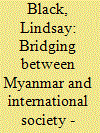

|
|
|
|
|
| Publication |
2013.
|
| Summary/Abstract |
Numerous academic works have critiqued Japan's Official Development Assistance (ODA) programme for being mercantilist and failing to promote democratization and human rights (Orr 1990; Rix 1993; Arase 1995, 2005). Such accounts assess Japan's ODA policy from Western theoretical perspectives that advocate Western approaches, such as military and economic interventions to contain repressive states. While receptive to these criticisms, Japanese policy-makers have perceived their country's international role in 'bridging' (kakehashi) terms and structured their ODA accordingly, as this paper details in the case of Japan's ODA policy towards Myanmar. 1
The rationale behind Japan's kakehashi approach lies in the construction of Japan's self-identity as a state able to reenter international society after World War II through focusing on economic development rather than military and coercive action. Proponents of the kakehashi approach construct Japan both as a model of successful democratization through development which other states can learn from, as well as the means through ODA to 'bridge' the divide between repressive regimes and liberal democratic capitalism. This critical approach examines Japan's kakehashi or bridging strategy in terms of Japan's response to the anti-government protests in September 2007, Cyclone Nargis in May 2008, and in the build up to parliamentary elections in November 2010 in Myanmar to demonstrate the permanence of this approach in spite of a change of government in Japan. In so doing, the kakehashi approach reveals opportunities to engage with, rather than contain, repressive regimes, thereby raising the possibility of enticing such states back into international society though economic incentives.
|
|
|
|
|
|
|
|
|
|
|
|
|
|
|
|
| 5 |
ID:
172040


|
|
|
|
|
| Summary/Abstract |
In 2005, Cabo Verde became the second African country to receive the new foreign aid programme of the USA, the Millennium Challenge Account (MCA). It was among the few recipients of a second grant. Foreign aid has always been a controversial and hotly contested issue, and the MCA is no exception. This paper, based partly on personal experience with the programme, provides a critical examination of the nature, process and implementation of the MCA grants in Cabo Verde. The country had campaigned aggressively for the grants. The MCA not only financed important public investments, it was debt-free and without conditionalities. However, even while it allowed more leeway over its use and implementation compared with other aid programmes, it engendered its own challenges.
|
|
|
|
|
|
|
|
|
|
|
|
|
|
|
|
| 6 |
ID:
125267
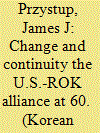

|
|
|
|
|
| Publication |
2013.
|
| Summary/Abstract |
It is important to recognize how successful the U.S.-ROK Alliance has been for the past sixty years in deterring North Korea from attempting to unify the Korean Peninsula by force. This paper addresses Korea's unique status and examines its strong presence in meeting commitments to the international community. The future will require alliance-based cooperation with international partners to address challenges posed by the proliferation of WMD, which is one among many. In the end, however, the U.S.-ROK Alliance will only grow stronger, enhancing stability and security on the Peninsula.
|
|
|
|
|
|
|
|
|
|
|
|
|
|
|
|
| 7 |
ID:
160486
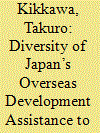

|
|
|
|
|
| Summary/Abstract |
This article analyzes Japan’s Overseas Development Assistance (ODA) policy in Jordan, focusing primarily on the areas concerning security. After the oil shock in 1973, security concerns in the Middle East affected Japan’s economic security policy. However, Japan’s long vulnerability in energy supply was not the sole determinant of its aid policies in the Middle East. Rather, a paradigm shift in the Japanese government’s ODA policy in the 1990s, the implementation of the human security approach, had a greater impact than economic security in subsequent Japanese ODA programs in Jordan. Japan has given more assistance to areas relevant to military security in its ODA in Jordan, particularly after increasing security concerns about the Middle East since the early twenty-first century. The two phenomena—Japan’s more aggressive commitment in the Middle East, including its deployment of Japan Self-Defense Forces (JSDF) in the region and Jordan’s greater responsibility in regional security—occurred simultaneously because of a series of crises after 2003. The unusual nature of Jordanian society today, a small society that hosts refugees from many nations, means the new Japanese ODA approach in Jordan has more diverse recipients than ever, as the country is becoming a host for a community of refugees.
|
|
|
|
|
|
|
|
|
|
|
|
|
|
|
|
| 8 |
ID:
174985
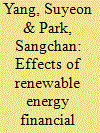

|
|
|
|
|
| Summary/Abstract |
Prior work has focused almost exclusively on the direct effect of external resources such as official development assistance (ODA) on renewable electricity generation in developing countries. We depart from this approach by suggesting that the influence of renewable energy (RE) ODA is contingent upon a developing country's internal capabilities to effectively utilize external resources. More specifically, we focus on RE financial incentive policy and political democracy to measure such capabilities and examine whether and how they moderate the relationship between RE ODA and renewable electricity generation. Analyzing panel data of 98 developing countries between 2000 and 2014, we find that the main effect of RE ODA significantly varies depending on the implementation of RE financial incentive policy and degree of political democracy. Our results add theoretical insight for studies on ODA effectiveness and generate policy implications for designing and disbursing renewable energy aid.
|
|
|
|
|
|
|
|
|
|
|
|
|
|
|
|
| 9 |
ID:
121863
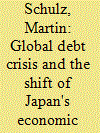

|
|
|
|
|
| Publication |
2013.
|
| Summary/Abstract |
Twenty years of slow growth and depression in Japan had a strong impact on relations with Southeast Asia. An explosion of public debt to 235 per cent of GDP has greatly reduced the ability of Japan's government to manoeuvre and has shrunk its overseas development assistance (ODA) contributions to the lowest levels of major donors. While its population was ageing, markets shrinking, and corporations restructuring, Japan became more inwardlooking. East Asia, at the same time, was catching up and now represents the world's most dynamic market. Today, Southeast Asia is not only the base for Japan-centred production and supply chains, but the focal point of future-oriented market investment. The article will follow the stage of Japan's "lost" decades, its evolving debt crisis, and show why the country will have to focus on much closer integration with Southeast Asia in the future.
|
|
|
|
|
|
|
|
|
|
|
|
|
|
|
|
| 10 |
ID:
160482
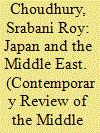

|
|
|
|
|
| Summary/Abstract |
As an introduction to this special issue, this article examines the shaping of Japan’s foreign policy; looking at how Japan has risen to the demand of the international community to assume more responsibility in conflict situations, circumventing a pacifist constitution that it had been dealt with. It then explains relations between Middle East and Japan and shows how the latter has been balancing its national interest in order to conform to its alliance with the United States. With more Asian powers having stake in the Middle East, Japan has become proactive about its role in the region. However, with limited hard power options, Japan would have to concentrate on its soft power capabilities and on using its economic strength to mark its presence in the Middle East.
|
|
|
|
|
|
|
|
|
|
|
|
|
|
|
|
| 11 |
ID:
087738


|
|
|
|
|
| Publication |
2009.
|
| Summary/Abstract |
This paper examines news coverage of overseas natural disasters in Japan and the United States and assesses the extent to which that coverage affects amounts and types of emergency assistance provided by each country's ODA program. The comparison between the two cases allows for the examination of the different effects of media on foreign policy as well as the different ways in which those effects are filtered through institutional arrangements within the aid policy-making apparatus in each country. Following up comparative work on media impact on development aid programs in five countries, this paper argues that the organization of emergency assistance programs is a key determinant in explaining media impact on aid policy.
|
|
|
|
|
|
|
|
|
|
|
|
|
|
|
|
| 12 |
ID:
105339
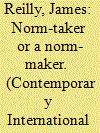

|
|
|
|
|
| Publication |
2011.
|
| Summary/Abstract |
As China expands its official development assistance (ODA) in Southeast Asia, is Chinese aid beginning to emulate international norms and practices or instead establishing its own distinct approach to development assistance? This essay argues that China's socialization into international norms varies with the thickness of the institutional environment. In Cambodia and Laos, China's aid program shows signs of alignment with international aid practices. At the regional level, however, China is beginning to act more like a norm-maker. Through expanding its financial support for select regional initiatives, Beijing is bolstering its ability to shape the norms and practices of regional developmental institutions. China's rising ODA in Southeast Asia poses a potential challenge to Australia's influence in the region, but also provides opportunities for greater diplomatic engagement and cooperation in support of regional development.
|
|
|
|
|
|
|
|
|
|
|
|
|
|
|
|
| 13 |
ID:
137876


|
|
|
|
|
| Summary/Abstract |
According to statistics on the ministry of petroleum and natural gas website, the offshore sector accounted for production of 18.2 million tonnes of crude oil (over 48 per cent of the nation’s domestic production) and 72.3 MMSCMD of natural gas (74.5 per cent of the domestic production) in 2013-14. The collective value of this annual output, even at the current depressed price of around USD 45 per barrel, is nearly USD 13.9 billion or over Rs 86,000 crore. The replacement cost of the infrastructure for extraction of oil and gas from sub-sea fields, at a conservative estimate, is well in excess of Rs 250,000 crore. Is enough being done to secure this strategic national asset?
|
|
|
|
|
|
|
|
|
|
|
|
|
|
|
|
| 14 |
ID:
073599
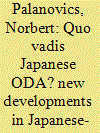

|
|
|
|
|
| Publication |
2006.
|
| Summary/Abstract |
Japan positioned itself in a special situation among the aid donor countries. This paper presents the trends in Japanese Official Development Aid policies in the new Millennium, provides an overview and discussion of the characteristics of Japanese ODA, and examines the different views and critiques that have arisen regarding Japan’s development aid policies. The paper’s goal is to highlight and interpret the latest developments and reforms of Japan’s ODA administration and strategies, its strengths and weaknesses, and to understand how ODA is becoming a more strategic, a stronger political, diplomatic and foreign policy tool in the hands of the Japanese government.
|
|
|
|
|
|
|
|
|
|
|
|
|
|
|
|
| 15 |
ID:
070572
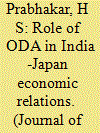

|
|
|
| 16 |
ID:
155833
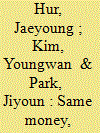

|
|
|
|
|
| Summary/Abstract |
In this study we suggest new approaches to conceptualizing South Korean aid to North Korea as equivalent to official development assistance (ODA) by looking at its historical background and present situation, as well as related laws. We review the characteristics and development of South Korean aid to North Korea, compare it to ODA, and suggest an innovative way of conceptualizing it as ODA. In particular, we assert that if South Korean aid to North Korea were considered ODA, South Korea would be able to effectively assist North Korea and become a more influential and responsible donor in international society.
|
|
|
|
|
|
|
|
|
|
|
|
|
|
|
|
| 17 |
ID:
138978
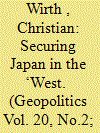

|
|
|
|
|
| Summary/Abstract |
Why has the military dimension of the US-Japan relationship remained the central point of reference for Japanese foreign relations, despite the demise of the Soviet Union? Why has Japan, deepening economic interdependence notwithstanding, remained politically distant from East Asia? Based on analysis of statements by Japanese and US political elites and academics regarding the US-Japan alliance, this article argues that the rise of China, coterminous with the rise of ‘Asia’, challenges the notion of the ‘West’ as, according to standards of industrial modernity, a superior social and political order. These moving ideational boundaries question Japan’s position as the most advanced Asian nation and member of the (Western) international society of states. Therefore, the US-Japan alliance has since the mid-1990s become increasingly important for securing Japan in the ‘West’ and the ‘West’s boundaries in East Asia.
|
|
|
|
|
|
|
|
|
|
|
|
|
|
|
|
| 18 |
ID:
161561
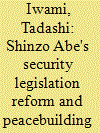

|
|
|
|
|
| Summary/Abstract |
Recent literature on Japanese foreign policy has focused on analysing the implications of Prime Minister Shinzo Abe's security legislation reform for the bilateral security alliance relationship with the US amidst a rising China and the right to collective self-defence. Its impact on Japan's multilateral security policy, in particular, peacebuilding, has so far received little attention. In what ways and to what extent does Japan play a peacebuilding role under this change? This article examines key implications of the security legislation reform, along with the renewal of Japan's Official Development Assistance charter, for its peacebuilding efforts. By taking Mindanao, the Philippines, as a case study, it argues that Abe focuses on taking a foreign aid-centred approach while showing little interest in sending Japanese Self-Defence Force. This article provides a counter-narrative to the claim that Japan is taking a more assertive approach to international security. Abe is more risk-averse as far as his approach to peacebuilding is concerned.
|
|
|
|
|
|
|
|
|
|
|
|
|
|
|
|
| 19 |
ID:
179779
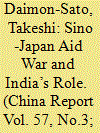

|
|
|
|
|
| Summary/Abstract |
For the past decade, China and Japan have been competing against each other over aid market with its implicit intention to pursue their economic interests, which turned into a rivalry between two diplomatic concepts: Chinese Belt and Road Initiative (BRI) versus Japanese Free and Open Indo-Pacific (FOIP) Strategy. The severe competition over high-speed rail (HSR) by two countries, joined by French and German competitors, has been intensified for the benefit of China, taking all of its catchup benefits with its dubious sense of rule of law. This article asks if the two initiatives can coexist with the entry of India into the game and form an equilibrium of ‘grand coalition’, benefiting all its players as ‘win-win-win’ game, which turns out to be feasible and unstable. Nevertheless, Japan still seems to have a good reason to keep India as a strategic partner of FOIP as well as a ‘gateway’ for Central and Western Asia with fragile states such as Afghanistan and Pakistan, and official development assistance (ODA) could play a significant catalyst role as ‘human security’ promoted by Professor Amartya Sen and ex-UNHCR Ms. Sadako Ogata. The COVID-19 pandemic together with the exit of the isolationist US administration may provide the world with glimmering sense of hope for the year 2021 and beyond, if and only if one becomes more aware of the complementarities of comparative advantage of China, India and Japan to pursue common interests.
|
|
|
|
|
|
|
|
|
|
|
|
|
|
|
|
| 20 |
ID:
170219
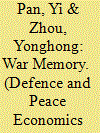

|
|
|
|
|
| Summary/Abstract |
On the basis of a natural experiment related to the Great East Japan Earthquake in 2011, the present work empirically analyzes the relationship between historical events and current attitude and determines whether regions that suffered severely during the Japanese invasion in World War II expressed small concern during the earthquake. After controlling for geographical distance, bilateral trade, and political characteristics, a negative relationship is found between the duration of invasion and number of related deaths in the invaded regions and their governments’ efforts in assisting Japan after the earthquake. Further analysis shows that political similarity to Japan helped in assisting them after the earthquake, but this effect was reduced for regions that sustained many deaths during the Japanese invasion. In addition, a mediation effect test shows that the help extended by Japan to several countries after the war through the Japanese official development assistance did not positively influence the amount of aid provided by such regions to Japan after the earthquake. These studies provide new evidence of the long-lasting influence of war. However, no robust evidence is found about the relationship between death rate and war memory. Therefore, even large countries cannot tolerate serious suffering during painful historical events.
|
|
|
|
|
|
|
|
|
|
|
|
|
|
|
|
|
|
|
|
|